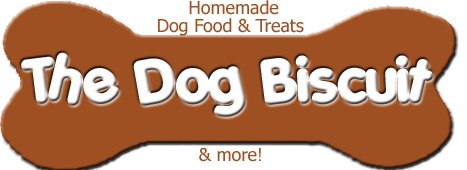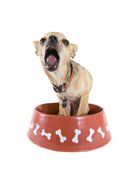 |
 | 
| ||
Homemade DogFoodAnd Probiotics for DogsThe best hypoallergenic dog food is homemade dogfood because you can control and test what goes into the food. If your dog suffers from digestive issues consider probiotics for dogs (in supplement form) and hypoallergenic dog foods. Before you make any changes to your dogs diet, talk with your veterinarian and make sure the problem is diagnosed correctly. Dogs get allergies just like people do, which leads their owners to seek out hypoallergenic dog food. Any dog can develop food allergies at any time in their lives. The hard part for humans is figuring out exactly the source of the allergy. Just switching dog foods doesnt always solve things - in fact, it can make matters worse. Often with allergies, its about testing what causes a reaction and what doesnt; make sure that you control the changes in your dogs diet. You can start by buying good quality hypoallergenic dog food to begin giving your canine some relief. If that doesnt help, consider making your own homemade dogfood, and start with a very bland diet/recipe to see how your dog reacts. Your Dog, Allergies and Homemade DogFood:Some of the most common dog allergies include preservatives and chemicals, flavorings, wheat, corn, eggs, soy, dairy, beef, chicken, yeast, and artificial colorings. So if youre buying hypoallergenic food, read the labels. Try to find organic dog foods: they will not contain the preservatives and chemicals that regular commercial foods do (make sure you check the life of all dog foods - even dry dog food can go off past its expiry date). Not all food that seems healthy is truly good for your pets diet. In fact, just the difference in carbohydrates and protein levels may cause digestive problems. When you switch to hypoallergenic dog foods, you want to pay close attention to your dog. For example, some brands include lamb or rice (often felt to be a low level diet risk - but not all dogs can tolerate all foods). If you switch and notice no change in your dogs condition, then you want to try a food that doesnt use lamb or rice as an ingredient. The process of trial and error can be a bit time consuming, but its worth it for the overall health of your pet. Its suggested that whenever possible you purchase trial size food bags so you dont end up with product you cannot use.
Hypoallergenic Dog Food: | Related Articles
Dog Health Info This section contains articles about dog health info. Each of these articles are meant to give you information about your beloved pooch. Dog Health Dog health and nutrition go hand in hand. Choosing the right diet for your pet is very important. Bad Dog Breath Does your dog's bad breath signal more serious health issues? Canine Ear Infection: Can be Painful and Serious Is your pet shaking its head or scratching its ear? What are dog ear infection symptoms and treatments? Canine Health: How Diet Affects Oral Health Did you know that a very important matter in canine health is taking proper care of your dog's mouth. Just like with us humans, proper oral care for your pet results in good general health. Canine Kennel Cough is a Serious Dog Sickness Coughing, fever, lethargy are just some of the symptoms of dog kennel cough. Find out more about symptoms and treatments. Dogs and Chocolate Chocolate is poisonous for dogs. Learn what to do if your canine eats chocolate. Dog Bad Breath If your pooch has bad breath, don't ignore it. Bad breath, or halitosis, can be a signal of other health issues. Dog Bladder Infection Make sure you know what the symptoms are of this common dog illness; and how to treat it. Dog Dehydration Water is a very important part of your dog's daily diet; understand the consequences of dehydration. Dog Depression Depression in your canine is more common than you might think; and more serious. Dog Ear Infection Treatment Ear infections in dogs is quite common; prevention is the best remedy. Dog Losing Weight: Is this Good or Bad? If your pet is losing weight too fast, it can be a signal of a serious health issue. Check it out. Dog Weight Control: It's Important for Your Pet If your canine is gaining weight or is pudgy and out of shape, you need to improve its diet. Dog Seizure Dog seizures can be a signal of poisoning or other serious dog illnesses. Dog Skin Conditions What causes dog skin irritations? How can you make your canine's skin healthy? Overweight Dogs Overweight in an animal can cause (or be a symptom of) serious health issues. Provide your canine with a good diet. Probiotics for Dogs Probiotics are life supporting bacteria, they can help improve your dog's overall health. Sick Dog Symptoms Is your pooch sick? What are the symptoms, causes and treatment for illness in your pet? Toxic Foods for Dogs What foods are dangerous to your pet? How to identify symptoms of poisoning in dogs? Yeast Infection - Dog Can dogs get yeast infections? How to identify and treat? | |||
|
Enjoy This Site?
Then why not use the button below, to add us to your favorite bookmarking service? | ||||
|
| Home | About
| Contact | Sitemap
| What's New
|Privacy Policy |
This site is for informational purposes only. If you have an issue with your dog's health, please see your vet.
Website design by Webmidwife.com | ||||
| | ||||






